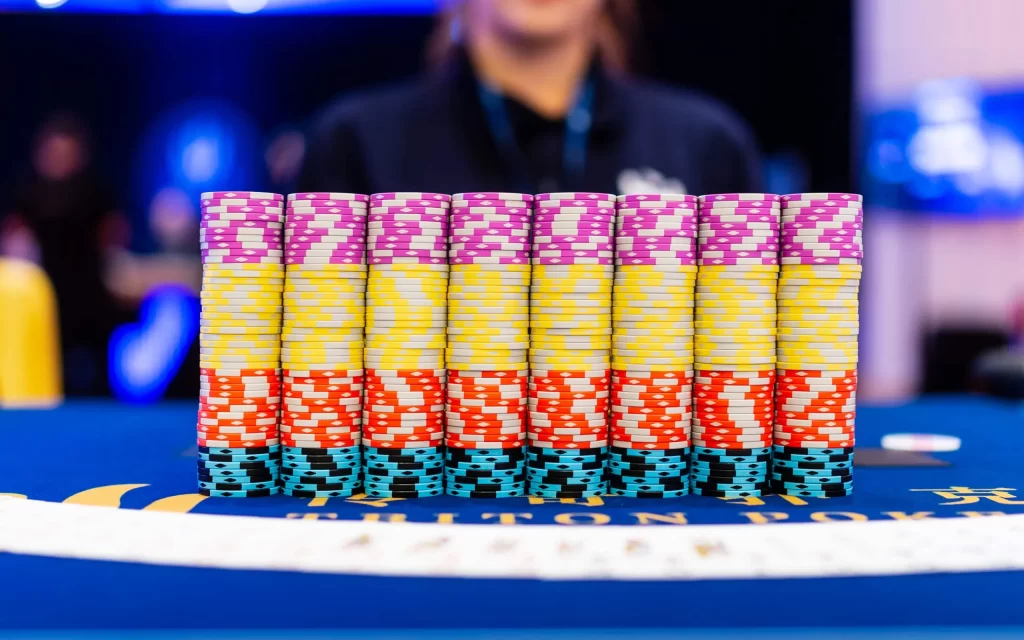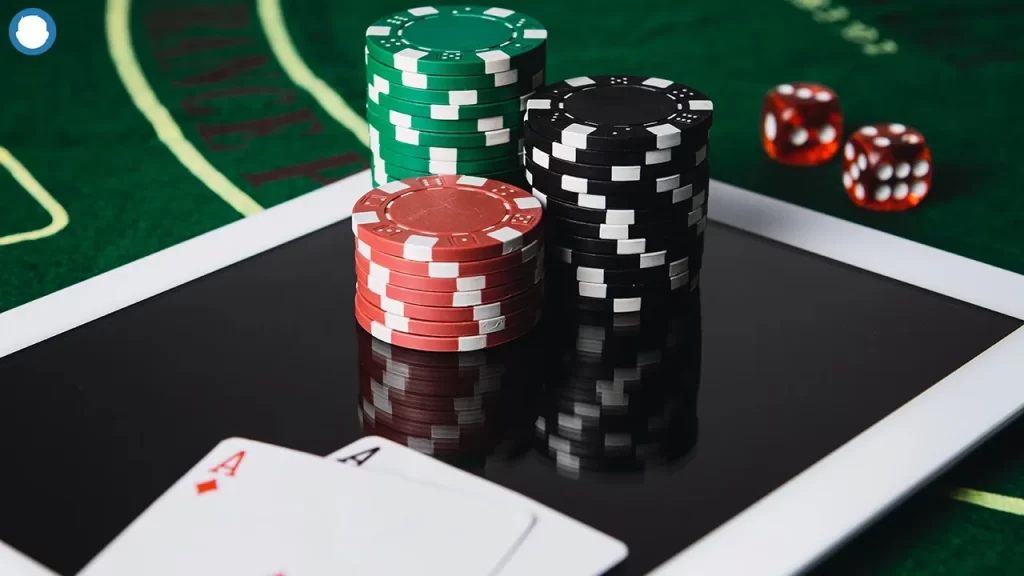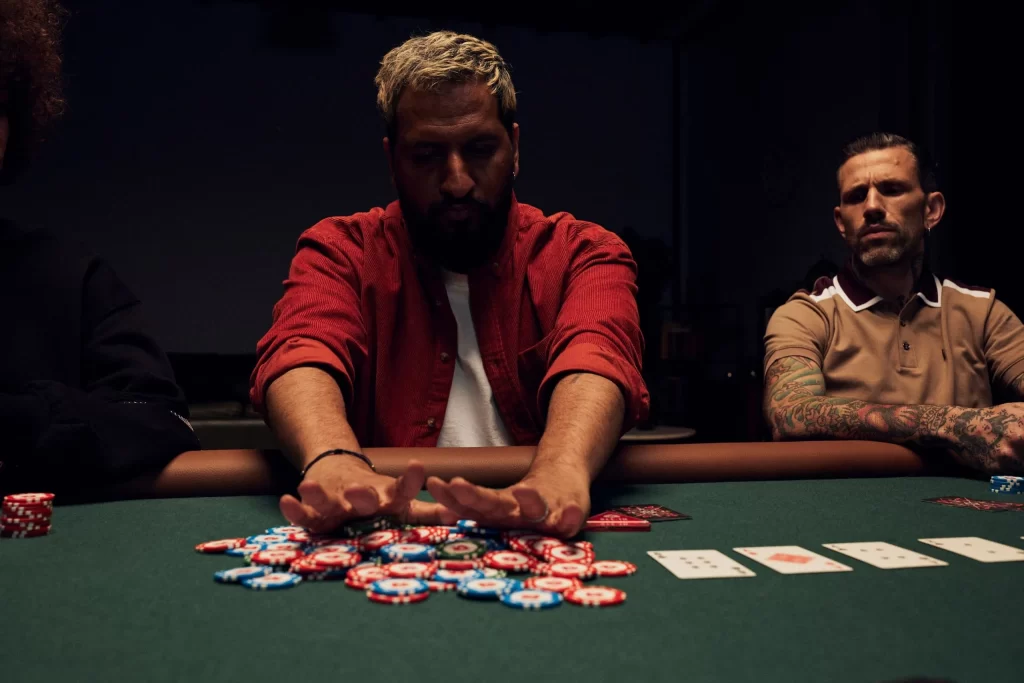Poker Terminology is not just a card game but also an art, where strategy and skill play an important role. Understanding and applying basic terms correctly is essential to become a successful poker player. Below NN777 will share important poker terms that beginners should master.
Poker Terminology in Card Ranking

In poker, knowing how to rank hands is basic and necessary. Poker decks are classified in order from strongest to weakest as follows:
- Royal Flush: The highest hand, consisting of five consecutive cards from 10 to A of the same suit. For example, a series of the same suit 10, J, Q, K, A. This is the highest hand in the deck
- Straight Flush: Five consecutive cards of the same suit are called a “Straight”. For example: 5, 6, 7, 8, 9 of the same suit. If there are multiple
- Straight Flushes, the hand with the higher value wins.
- Four of a Kind: Four cards of the same number, plus another card (kicker). For example: 7, 7, 7, 7, and another card. The higher Four of a Kind wins.
- Full House: A hand consisting of three cards of the same number and another pair. For example: 4, 4, 4, 9, 9. If there are multiple Full Houses, the hand with the higher three of a kind wins.
- Flush: Five cards of the same suit but not necessarily consecutive. For example: 2, 5, 8, 10, Q of the same suit. In the case of multiple Flushes, the person with the highest card in the Flush wins.
- Straight: A “straight” is a set of five cards that are consecutive in value but not of the same suit. For example: 3, 4, 5, 6, 7. If there are multiple Straights, the hand with the higher card wins.

- Three of a Kind: Three cards of the same number, plus two other cards. For example: 10, 10, 10, and two other cards. The higher Three of a Kind wins if more than one person has a Three of a Kind.
- Two Pair: Two pairs, plus one other card. For example: 8, 8, 5, 5, and one other card. If more than one person has Two Pair, the hand with the higher pair wins.
- One Pair: One pair, plus three other cards. For example: 9, 9, and three other cards. If more than one person has One Pair, the hand with the higher pair wins.
- High Card: When there are no other combinations, the hand is determined by the highest card. For example: A, K, 7, 5, 3. In the case of multiple players having High Cards, the player with the highest card wins.
Poker Terminology During Betting Rounds

Poker has several betting rounds, each of which plays an important role in determining the final outcome:
- Pre-Flop: This is the first betting round that takes place right after the player receives two hole cards. Here, the player can decide to call, raise, or fold. The decision in this round will greatly affect the strategy in the following betting rounds.
- Flop: After the Pre-Flop betting round, the first three community cards are turned up. Players will rely on these community cards to decide their next action. This betting round helps players evaluate their hand with the appearance of the community cards.
- Turn: This is the betting round after the fourth community card is turned up. Players will have more information about their hand and the community cards to decide how to continue betting. The Turn is an opportunity to adjust strategy based on the current situation.
- River: The final betting round occurs after the fifth community card is turned up. This is the last chance for players to optimize their hand and decide on a bet. After the River, all cards have been turned up, and players will proceed to the Showdown phase to determine the winner.
Poker Terminology During Play
In each betting round, players have action options, each of which has important strategic implications:
- Check: Do not bet, waiting for another player’s turn. This action is often performed when a player does not want to raise the bet but still wants to stay in the game.
- Bet: Put an amount of money into the pot to start or continue the betting round. This is an active action to build the pot or force opponents to decide whether to continue participating or not.
- Call: Bet an amount of money equal to the previous player’s amount. This action is performed when a player wants to continue participating without raising the bet.
- Raise: Increase the bet amount compared to the previous player’s bet. This is an offensive action to put pressure on the opponent and increase the pot value.
- Fold: to pass the hand and not continue to participate. This is a decision when your hand is not strong enough or no longer has a high chance of winning.
Conclusion
Understanding and applying poker terminology correctly is an important first step to becoming a successful poker player. Mastering concepts such as hand rankings, betting rounds, and poker actions will help you make more accurate strategic decisions and increase your chances of winning. Take the time to learn, practice, and improve your skills so you can enjoy and succeed in the game of poker.
